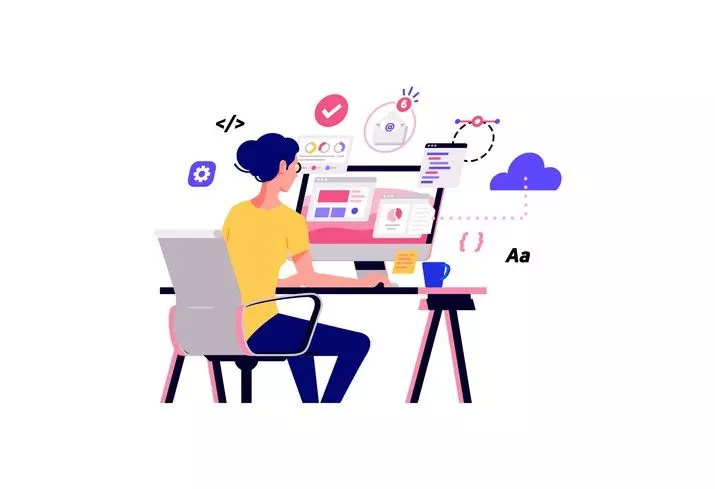The sheer volume of data to navigate and isolate prompted the innovations in NLP and now Google’s Passage Indexing search update.
We’ve all been there: “How do I phrase the question I want to ask Google to get results that match my question?” Luckily, search engines are working harder than ever to “optimize” the results delivered to you by finding relevant content matching important search terms. Since there are quite literally millions of potentially relevant options for any given question, innovations in Natural Language Processing, or NLP, have been crucial to providing quality results. In fact, NLP is why you can make typos and still get answers. But if SEO as we know it has been about finding the right keywords and making sure you page has them in all the right places, then what’s next when web tools bring context into the mix?
The Future of SEO
SEO’s importance will now rest on computer software decoding human language and discern what a human is looking for in order to give them the best data possible. If misunderstandings can even occur between two well meaning humans, adding a machine built by humans to try and facilitate data transfer is quite a feat. With all of the tagging and embedding options for coding and flagging data, now how that data is being housed and presented is becoming increasingly important in order to filter results properly.
In addition to having the “right answer” to a potential customer or client’s inquiry, offering visitors a unique, compelling experience by presenting the data in an appealing way without redundantly stating keywords for sheer SEO value will be all the more important since search engines are beginning to factor in quantity and quality of searches with NLP.
What Is NLP?
Converting human language into something computers can understand means taking more than just what individual words mean at face value. If computers still functioned like that, Google and other search engines as we know them would only be able to provide usable results if the query words were perfect. Humans are certainly imperfect, as is technology, but Natural Language Processing is the attempt to help a computer make sense of human quirks in language like idioms, expressions, over-arching ideas, and even typos or other human mistakes. Whether the data is typed or spoken, the data is now translated back and forth from human to computer, computer to data, then computer back to human. This input exchange is crucial to getting your page found by users to generate more profits and brand awareness because digital experiences are becoming more like interpersonal experiences with each tech innovation.
Natural Language Processing teaches computers the rules of language that humans learn as children. However, learning how these rules teach search engines what to find and crafting your content and SEO strategy around those rules makes your page the easy choice for software needing quality information for a user. By programing things like chatbots and other automations within your virtual experience for customers to understand common contexts for your ideal customers, said customers will feel right at home speaking a common language.

What About Google Passage Indexing?
If NLP is how computers understand humans, Google’s latest update of Passage Indexing is that understanding heightened to a personalized level. Using Google’s BERT technology, Google now finds the most relevant passages within search results to provide the information as efficiently and quickly as possible. The only way to know if information deep within a passage is relevant is to understand the context of the data that houses the words making up that data. If NLP standards are how software understands a sentence, BERT is how software understands how groups of sentences form context for humans.
BERT uses transformers, which are models that decode words in relation to other words in sentences thereby factoring in multi-word context into searches. This means computers no longer search for things based solely on each word in the search bar by themselves. Instead, it factors in what putting them together would mean on a larger scale. This advancement is incredible but witnessed constantly in every day life by quality search results appearing despite a spelling error because the search “makes sense” to the computer. Google now “gets the idea” behind the search rather than only the literal search words.

What Does This Mean for SEO Marketing Strategies?
Trying to think of the right way to phrase what you’re looking for is the epitome of the modern human struggle. All of the information on the internet is useless if you can’t access it. Now that technology is making access easier than ever, your marketing strategy needs to integrate SEO throughout the building and design of your website to ensure valuable information is easy to find and plentiful on your website. Offering information in a variety of contexts while making good use of the search terms that are most relevant to your content helps raise your trustworthiness with artificial intelligence that is combing through millions of options to present to people.
SEO is more than optimizing your placement in a search engine list. SEO strategy means understanding that your SEO ranking is the modern way of introducing your brand and business. Your ranking of relevance in your industry now hinges on your SEO plan to meet your customers where they are while they’re still searching for you.
What’s Next?
Consider your SEO strategy to be how to make your first impression before you even reach your first customer. Building a brand of quality with your passion and drive is an absolute must to begin any enterprise. The next step of having consumers find you requires knowing where and how they look for services like yours. Analytics based on your ideal customer will help determine what kind of searches and related terms you can use to help search engines discover and showcase your brand for you. Google is making understanding those analytics even easier to make your strategies that much more effective.
At ULS, we take SEO seriously and build it into our strategies to maximize client returns and grow brand awareness and reach while getting your business to the top of the page. Contact our team of experts for SEO tactics to elevate your business’s search rankings today.













Leave a Comment
Comments (0)